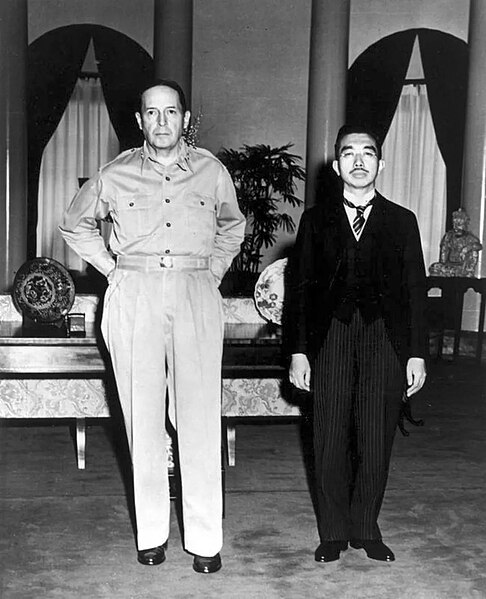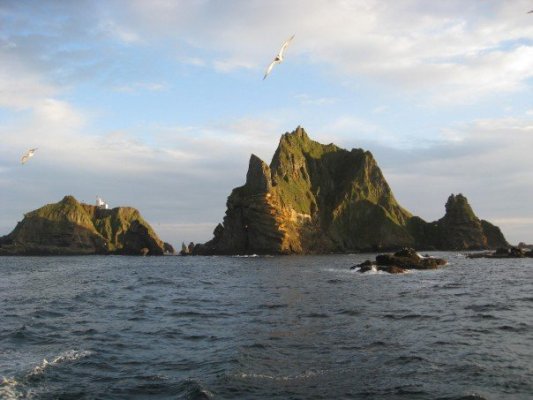
This article is based on Kazutoshi Hanto's "Showashi (The History of Showa) " for organizing a part of Japanese history with a certain viewpoint. I don't think that this is the one and only truth.
1928
Kwantung army (Japanese troops in northeast China) assasinated Zhang Zuolin, the warlord of Manchuria.(Japan had supported him, however he began to get out of Japan's control, therefore the Kwantung army murdered him secretly without permission. After that, many people were suspicous about the Kwantung army imvolvement.)
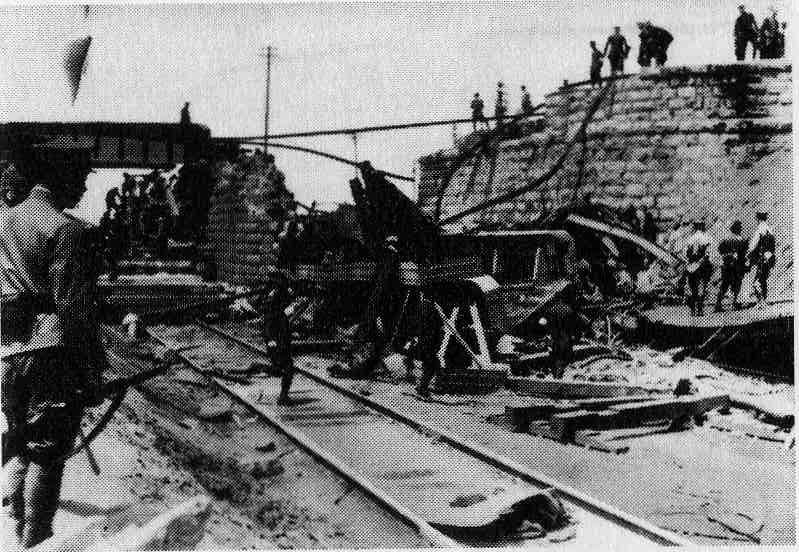
The Zhang Zuolin assasinated place (All pictures in this article are public domain from Wikipedia Commons, unless otherwise described)
1929
(1) The emperor ordered the prime minister Tanaka to survey the Zhang Zuolin incident. However, Tanaka couldn't complete his mission because of the army's interruption against Tanaka's survey, therefore the emperor reprimanded him. After that, Tanaka resigned as prime minister and died three months later. (At that time, Japanese people were taught that the emperor was God. Tanaka was heavily shocked from emperor's reprimand.)

PM Tanaka
(2) The emperor blamed himself for Tanaka's death and he made up his mind to accept the cabinet's consensus on proposals or reports if he was against them. → The emperor became "speechless"

Emperor Hirohito(1932)(Bundesarchiv, Bild 102-12923 /
CC BY-SA 3.0 DE)
1930
(1) The delegation for the London Disarmament Conference got the agreement which Japan would be able to construct 69.75% of the support vessels compaerd to the US numbers, for the original target of 70%. Therefore they sent telegraph instructions for the navy's directions for the acceptance.
(2) At first, the Navy agreed with the delegation's instructions.
(3) The emperor approoved the delegation's instructions.
(4) After the Emperor's approoval, the Navy went against the instructions.
(5) The emperor was surprised at the Navy's change.
(6) For the London Disarmament Conference, the nongovernmental parties declared the theory "Never interrupting the Emperor's right to control the armies" → the parliament accepted the rule "Even though the PM never be against the army about war affairs"
(7) The government ratified the treaty of disarmament.
(8) Their opinion was normal as mass media: "The nongovernmental parties theory was merely a campaign to topple the government."
(9) The navy were separated to supporters and opponents of the Disarmament Conferece result. The supporters left the Navy and the opponents joined of key posts of the Navy.
1931 to 1932
(1) Yosuke Matsuoka (The vice president of Manchuria Railways) declared "Manchuria and Mongolia are the lifeline of Japan." → this was spread among the masses.
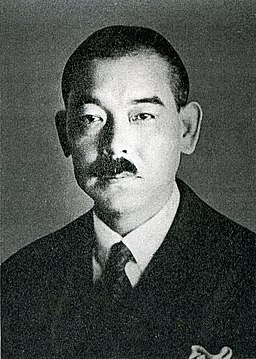
Mastuoka(1932)
(2) The tone of mass media was "the problem about Manchuria and Mongolia shouldn't be solved by the military power."
(3) The emperor ordered the minister of the Army, "The military discipline looks loose, therefore you should dicipline the Army to observe the military discipline."
(4) The Plannning Director of the Army Takekawa, who was ordered by the Minister of the Army to dicipline the Kwantung army, went to the office of the Kwantung army by train, not by airplane, because he was worried about persuading the Kwantung army.
The Kwauntung army got him drunk and he didn't persuade the army. After that, the Kwantung Army broke up the invasion to Manchuria (The Ryujoko Incident)

The Ryujoko Incident place

Tatekawa
(5) Suddenly the newspapers began to support the Kwantung army. Asahi and Mainichi (Japanese big quality papers) released many ads of them with a large budget and increased their number of sales.
(6) Prime Minister Wakatsuki said, "Did the Kwantung Army enter Manchuria? So we can't stop it anymore." (The approval of the Ryujoko Incident)

PM Wakatsuki
And the emperor ordered Prime Minister Wakatsuki, "As for the problem about Manchuria and Mongolia, you should maintain the strengthening of Japan-China relations."
(7) The US noted that Japan's invasion of China is a violation of the non-belligerence pact. (Before that, it was relatively conciliatory to Japan.)
(8) The emperor declared "The Kwauntung army did a good job" * *The author of this book said, "This is the biggest mistake of the Emperor.
(9) Manchuria (virtually Japan's puppet state) was established.

Inauguration Ceremony of Chief Executive of Manchukuo
(10) Commander Honjo and Staff Officer Ishihara, the main manipulators of the Ryujoko Incident, who should have gotten the death penalty according to the militaly rules, got a promotion instead. *The author of this book said, "This is the moment of the Showa era collapses."

Honjo (1933)

Staff Officer Ishihara (1934)
(11) China had difficulty confronting The Japanese Army because it was in the middle of the civil war (Chinese Nationalist Party vs Chinese Communist Party)
1932
Prime Minister Inukai was assasinated by young navy officers The Navy Genereral Saito became the PM (The end of party Government)

Osaka Asahi Shinbun
1933
(1) When the emperor heard the cabinet's plan to leave the League of Nations, he said "I think that Japan doesn't have to leave the LN and should stay in the LN."
(2) Japan left the League of Nations → It became difficult for Japan to get overseas information for proper political judgements.

Tokyo Asahi Shinbun on the following date of left the League of Nations
(3) "Go-Stop Incident" (The Osaka Police confronted the Army for their ignoring of red lights during their training then they were compromized.) (It was the last confrontation among the Army and civilians. After that, all the people in Japan never went against the Army)
1935
From 1910s to this year, the citizens, the government and emperor Hirohito supported the "emperor-organ" theory, which means that the owner of the sovereignty of Japan is the citizens, not the emperor, and the emperor is one of the organs of the nation.
That year, Prime Minister Okada declared that Japan is a nation whose ruler is the emperor. After that, the government began to strictly control theories which were against the declaration including the "emperor-organ" theory."

PM Okada(1936)
1936
(1) The February 26 Incident broke out. (The incident was the abortive coup d'etat by young officers of the Japanese Army. They thought that they killed the old ministers and the emperor ruled directly then that Japan's social problems such as political corruptions or poverty in rural area were solved. They killed some ministers and occupied some mass media buildings. After that, the emperor quickly commanded they eliminated. The leaders of the incident were then executed.)
After this incident, the army began to controled the government and took advantage of fear of terrorism like this incident.

Officers at the February 26 Incident
(2) From the beginning, he commanded the army and police to deal with the incident.
(3) The cabinet (PM Hirota) implemented a rule which let only an active service military officer be assigned to minister of the army or of the navy. This rule gave the army strong power to control the cabinet.

PM Hirota
1937
(1) The regimental commander of a area of China, Mutaaguchi, commanded his soldiers to resist The Chinese army, which fired two bullets at them during training at night. However, his boss, the brigade commander Kawabe, admitted it without speaking. Then, the second Sino-Japanese War began.

Mutaguchi
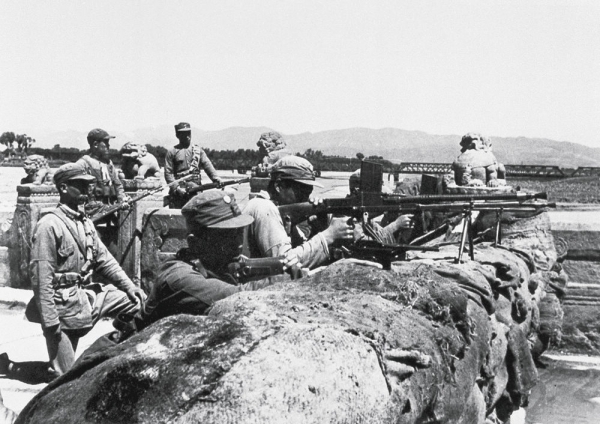
Chinese army against Japanese army
(2) The German Ambassador to China, Oskar Trautmann, attempted to make a peace between the Japanese Army and Chiang Kai-shek of the Chinese Kuomintang Government. (Trautmann Mediation) .
1938
The Japanese prime minister Konoe refused the Trautmann Mediation. He declared, "We have decided not to negotiate with the the Chinese Kuomintang government anymore."

PM Konoe
1939
(1) The National Spiritual Mobilization Law takes effect. (The government began to control its citizens' lives and thoughts to save resources and to use them for the military. They refrained from a luxury lifestyle. For example, perms for hair were prohibited. Propaganda phrases like: "Luxury is our Enemy" "We never want anything till we win [wars]" "Kill our selfish minds and let our nation prosper")

"Luxury is our Enemy!"
(2) German-Soviet Non-aggression Pact concluded.
(3) The General staff office of the Japanese army was shocked at German-Soviet Non-aggression Pact (They were lacking the ability to research and analyze the movement of world affairs.)
(4) The Emperor commanded the government to cooperate with the UK and the US.
(5) World War II broke out (Germany invaded Poland.) "
1940
(1) Representative Takao Saito criticised the Army that it didn't end the Japan-China war, and was expelled from the diet by the Army. (This was the last critical comment from the Diet to the army.)
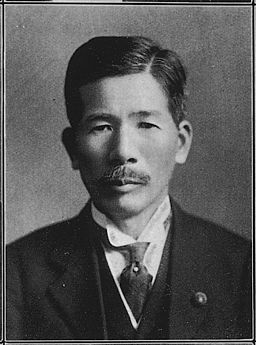
Rep. Saito(1929)
(2) The US declared the abolition of the Treaty of Commerce and Navigation between Japan and the USA and prohibited the export of steel from the US to Japan.
(3) The Japanese army entered the northern area of French Indochina (Vietnam)
1941
(1) Japan signed the Tripartite Pact between Japan, Germany and Italy.
(2) The US proposed an improvement plan for US-Japan relations from two Americans, Bishop Walsh and Father Drought, to a Japanese banker, Ikawa.
(3) Both the Cabinet and the Japanese Army accepted the improvement plan. However, Prime Minister Konoe decided to wait for the opinion of Matsuoka, the Minister of Foreign Affairs, who had been abroad. After his arrival in Japan, he ended up refusing the plan.
(4) Hull, the Secretary of State told the US policies to Nomura, the ambassador to the US that Japan had to "withdraw from the Tripartite Pact, China and Northern area of French Indochina", and "give the US the opportunity for getting involved in Manchuria concessions."
(5) On the 2nd of July, the second supreme conference in the presence of the emperor decided the direction of "We won’t hesitate to enter into a war against the US"
(6) The Japanese army made an entered the southern area of French Indochina.

Japanese army in Saigon
(7) The US froze Japanese assets in the US and prohibited the export of oil to Japan.
(8) Seeing the agenda of the supreme conference in the presence of the emperor, the emperor asked Sugiyama, the Army Chief of Staff.
Emperor: You wrote "First: preparing for war. Second: diplomatic negotiation". Is it a reverse sequence, isn't it?
Chief: We (army) are able to solve the problem in Southeast Asia within three months after the beginning of war against the US.
Emperor: When the Japan-China incident (war) began, you said you would end the war in China within one month. However, now four years have passed, you didn’t end the war in China.
Chief: China is vast therefore the plan hasn’t progressed as planned.
Emperor: The pacific is larger than China, isn't it?
Chief couldn't reply to the emperor.

Sugiyama(1944)
(9) Prime Minister Konoe proposed a summit conference with President Roosevelt.
(10) President Roosevelt refused a summit with Japan.
(11) PM Konoe resigned as Prime Minister. Just two days after, Tojo (war plan supporter) constructed his cabinet.
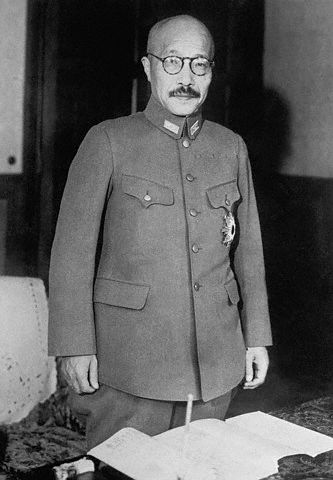
PM Tojo
(12) Every newspaper supported the start of Tojo cabinet. For instance, Tokyo Nichinichi (daily) News wrote "The beginning of all one-hundred-million-Japanese people army progression"
(13) The Japanese government asked the US to "Export oil to Japan, in exchange for withdrawal from French Indochina"
(14) The US refused Japan's request and told them that "Japan must resume Asia as the condition in 1931"

Hull, Nomura and Kurusu on 7 December 1941
(15) On the 1st of December, Japan decided to declare war against the US at the fourth supreme conference in the presence of the emperor.

Franklin Roosevelt signing declaration of war against Japan
The chart of "How Japan started the war with the US"
"(1) " and (2) "… in the box mean the order of incidents in the same year.
-Red ink means the reasons that began the war, green ink means the important incidents that changed Japanese society or conditions.




 This article is based on Kazutoshi Hanto's "Showashi (The History of Showa) " for organizing a part of Japanese history with a certain viewpoint. I don't think that this is the one and only truth.
This article is based on Kazutoshi Hanto's "Showashi (The History of Showa) " for organizing a part of Japanese history with a certain viewpoint. I don't think that this is the one and only truth.























